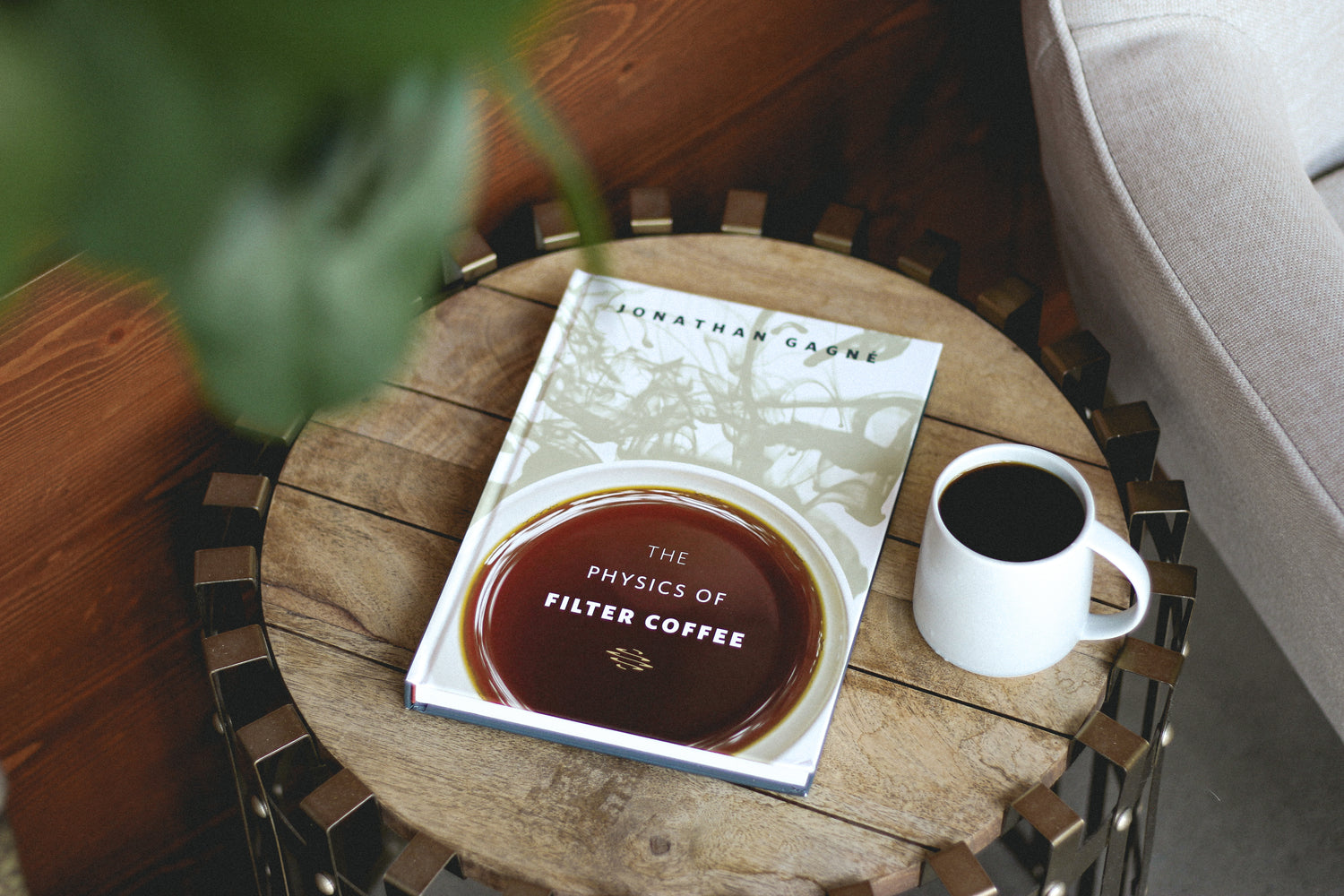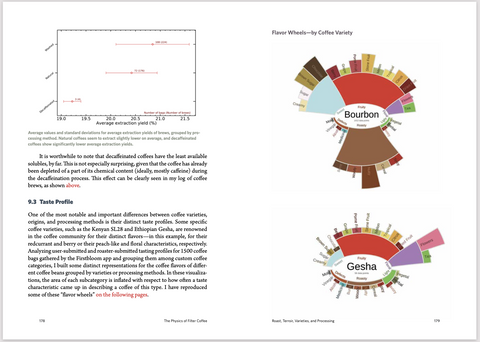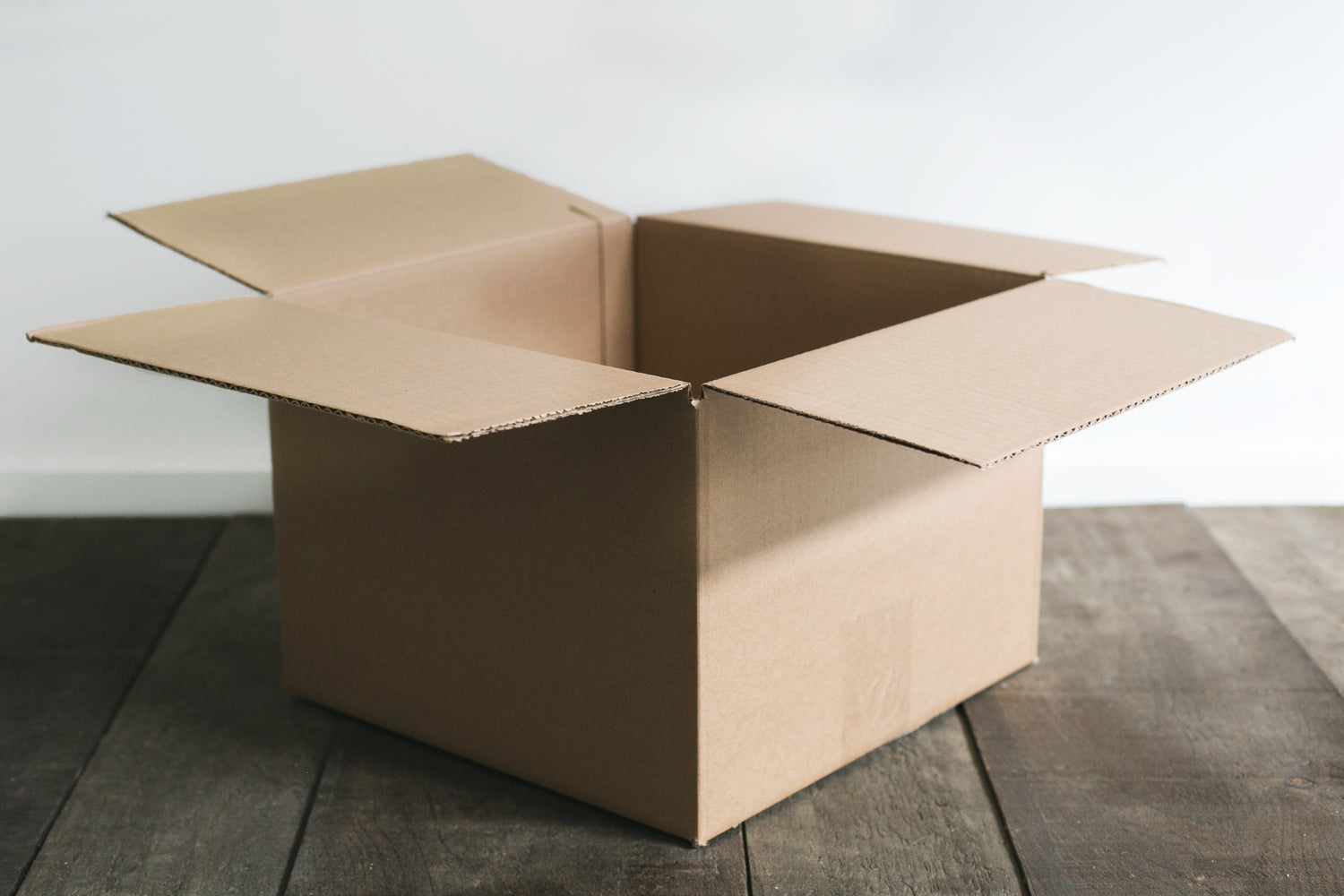"The Physics of Filter Coffee" Book Review


The last morning coffee you made, while you patiently waited for your synapses to fire on all cylinders, was probably done without thinking about the actual physics of the process itself. As Michael Polan points out in his 2020 audiobook, “For most of us, to be caffeinated to one degree or another has simply become baseline human consciousness.” Therefore, during pre-coffee mornings you’re literally not yourself. You’re likely on autopilot and not thinking too hard about science as you brew your first coffee, unless you’re Jonathan Gagné.
Gagné, an astrophysics researcher and adjunct professor at the university of Montréal, recently wrote “The Physics of Filter Coffee,” a new book of insightful filter coffee research. The book serves as a much-needed deep dive into what happens while you’re making coffee and focusing on the materials and processes at play. If you’re the kind of person who’s into food science and geeking out on pour overs, you’ll probably love reading this. And it’s safe to say that Gagné’s relentless obsession with trying to understand filter coffee pairs well with his background. After all, how many of us have relied on caffeine to get through a university paper?

Brewing pour over coffee can be a very mindful process, meditative almost. For me, personally, I find that during those 3 minutes, while I carefully pour water onto ground coffee, I’m not thinking about work emails or the yelling in the street below my apartment. I just focus on carefully pouring the water because I know that the more focused I am, the better the coffee will be. However, things like fluid dynamics, “Darcy’s Law” (q = Q/A = -K*dh/dl), hydraulic permeability of paper coffee filters, the solubility of different coffee bean varietals, and particle size distribution of ground coffee are all at play while you’re zoned out. It’s a lot. And for those of you like myself who are not scientifically-minded, it might seem overwhelming—this is coffee, after all.

But Gagné’s book does offer unique insights for both the layman and the scientifically astute, perhaps enough to make you appreciate your filter brews even more, no matter how good your physics grades were. The fact that a book like this didn’t exist before proves how little we really understand about filter brewing. You could also argue that there appears to be more studies on—and fussing over—espresso brewing. Not anymore! And I can only assume that this book will inspire even more investigation into filter coffee, though, it’ll be hard to top Gagné in terms of the sheer scope of analysis.
The book has 11 chapters which covers: Percolation, Drippers, Kettles and Agitation, Roast, Terroir, Varieties, and Process, to name a few. There are many graphs and diagrams peppered throughout, which help to illustrate experiments and data sets, and the general layout is well done. The scariest section for me was the mathematical variables and physics equations at the end— math and physics nerds can rejoice while I reach for some Advil to ease the brain-bruising! Your average home brewer may never tackle these equations—or even fully comprehend them—but it’s pretty cool that Gagné has put down some empirical and objective evidence to support his theories.
I think one of the goals of this book is to lay rest to many of the axioms of filter coffee brewing we've adhered to in the past. There’s so much hobby science lurking on the margins of the internet and amongst baristas, and really, who would you rather get your information from? A rando on Reddit or an astrophysicist with the training to properly undergo experiments in a lab? No offence to Reddit user “cupofjoe9922” from Nebraska, but I’ll go with Gagné every time.

Has this book changed my life? No. Has it drastically influenced how I look at filter coffee brewing? Yes. I’ve imparted subtle tweaks to my brewing taken directly from the book, such as longer bloom times—I used to opt for 30-second blooms; now I’m going for 50 seconds. I then began to reconsider filter paper and how it affects extraction. His chapter on Kettles and Agitation made me dust off old stovetop goosenecks I hadn’t used in ages from my collection (yes, I collect kettles!) and try to see how the flow rates differ. (My current fav is the Timemore Youth Pour Over kettle). It’s made me pull out old drippers from the back of the cupboard, and consider purchasing new (to me) ones like the Fellow Stagg X, rekindling my nerdy side that thrives on recipe development. Once Brewer’s Cup is slated to take place again, you better believe I’ll be busting this text out for reference. What’s more, the principles and insights in Gagné’s book not only apply to cutesy Japanese drippers, but also to your AeroPress and your automatic brewer. This pan-filter brewing appeal is why I’ve been recommending the book to coffee friends with curious tendencies who use everything from Bonavita automatics to gorgeous KINTO brewing sets. If you have a family member who loves to nerd out on coffee and also studied, say, engineering, then I can’t think of a better Christmas gift! There’s a lot to chew on here and I’m sure this book will serve as a resource that I keep coming back to, much like Water For Coffee or The World Coffee Atlas.
Einstein once said, “The important thing is not to stop questioning. Curiosity has its own reason for existing.” I think this is why I’ve been working in the coffee industry for almost 10 years, and I’m still learning; us coffee people are curious, and I think it’s infectious. I hope you feel the same way and will be inspired to brew better from this incredible book!
Having trouble deciding which brew method to use? Email us: hello@eightouncecoffee.ca— we’re here to help! We also have a wonderful curation of some of the best roasted coffee around for you to try!
For more information on the aforementioned brew methods and to stay in the loop with new products, subscribe to our YouTube channel!





